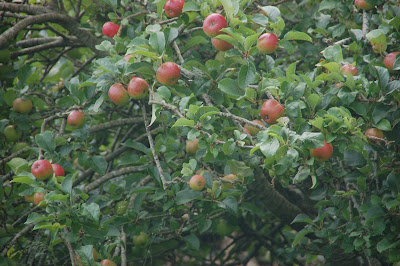Apples in Eden

Sonraigh is the Irish word for, particularize, specify, define, perceive, distinguish
I wonder if moving to Ireland has made me foreign to myself. It's 4:02 AM and I've been awake for the past two hours. Not anxious or fretful. Awake. This foreignness seems to originate in my being away from nearly all of the people and geography that has helped to shape me for the past (dare I say it?) 50 years. Do I notice my aging here more because it's out of context--something that was gradual and daily in America; but, in relocating, sudden and pronounced after a day of digging new beds and moving sods. Does my body forget that it has gardened much of it's life because it is gripping a different soil, or is it still in a kind of transplant shock? I have friends here--kind and interesting people; but, our history is via their history with Frank. I'm grafted into lives here as opposed to being rooted in America. Still, this is the first place I've lived since I was a girl, where I have enough land to put down roots and the land that I look out upon in every direction is breathtaking--Ben Bulben to the East and Knock na Rae to the West. Ireland still has a 100,000 welcomes. Caed Mille Failte. Today my apple trees arrived. One Irish Pitcher and two White Croftons from Irish Seed Savers. They are all native to Sligo. I may not be native; but, I am home.
"John Chapman"
He wore a tin pot for a hat in which
he cooked his supper
toward evening
In the Ohio forests. He wore
a sackcloth shirt and walked
barefoot on feet crooked as roots. And everywhere he went
The apple trees sprang up behind him lovely
as young girls.
No Indian or settler or wild beast
ever harmed him, and he for his part honored
everything, All God'screatures! thought little
on a rainy night,
of sharing the shelter of a hollow log touching
flesh with any creatures there; snakes,
raccoon possibly, or some great slab of bear.
Mrs. Price, late of Richland County,
at whose parent's house he sometimes lingered,
recalled: he spoke
only once of women and his gray eyes
brittled into ice. "Some
are deceivers," he whispered, and she felt
the pain of it, remembered it
into her old age.
Well, the trees he planted or gave away
prospered, and he became
the good legend, you do
what you can if you can; whatever
the secret, and the pain,
there's a decision: to die,
or to live, to go on
caring about something. In spring, in Ohio,
in the forests that are left you can still find
sign of him: Patches
of cold white fire.
From American Primitive Poems by Mary Oliver
Tags: Siol: Irish for seed

Comments